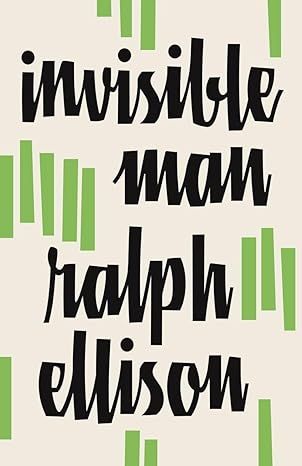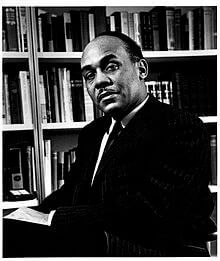Invisible Man
4.5
-
8,098 ratings
NATIONAL BOOK AWARD WINNER • NATIONAL BESTSELLER • In this deeply compelling novel and epic milestone of American literature, a nameless narrator tells his story from the basement lair of the Invisible Man he imagines himself to be.
One of The Atlantic’s Great American Novels of the Past 100 Years
He describes growing up in a Black community in the South, attending a Negro college from which he is expelled, moving to New York and becoming the chief spokesman of the Harlem branch of "the Brotherhood," before retreating amid violence and confusion.
Invisible Man is Ralph Ellison's first novel, the only one published during his lifetime. It was published by Random House in 1952, and addresses many of the social and intellectual issues faced by African Americans in the early 20th century, including black nationalism, the relationship between black identity and Marxism, and the reformist racial policies of Booker T. Washington, as well as issues of individuality and personal identity.
Invisible Man won the U.S. National Book Award for Fiction in 1953, making Ellison the first African-American writer to win the award. In 1998, the Modern Library ranked Invisible Man 19th on its list of the 100 best English-language novels of the 20th century. Time magazine included the novel in its 100 Best English-language novels from 1923 to 2005 list, calling it "the quintessential American picaresque of the 20th century", rather than a "race novel, or even a bildungsroman". Malcolm Bradbury and Richard Ruland recognize a black existentialist vision with a "Kafka-like absurdity". According to The New York Times, Barack Obama modeled his 1995 memoir Dreams from My Father on Ellison's novel.
Kindle
$2.99
Available instantly
Audiobook
$0.00
with membership trial
Hardcover
$16.99
Paperback
$10.95
Ships from
Amazon.com
Payment
Secure transaction
ISBN-10
9780679732761
ISBN-13
978-0679732761
Print length
581 pages
Language
English
Publisher
Vintage
Publication date
March 13, 1995
Dimensions
5.17 x 1.07 x 7.97 inches
Item weight
2.31 pounds
Popular Highlights in this book
Without light I am not only invisible, but formless as well; and to be unaware of one's form is to live a death. I myself, after existing some twenty years, did not become alive until I discovered my invisibility.
Highlighted by 536 Kindle readers
That I am nobody but myself. But first I had to discover that I am an invisible man!
Highlighted by 513 Kindle readers
Please, a definition: A hibernation is a covert preparation for a more overt action.
Highlighted by 418 Kindle readers
Product details
ASIN :
0679732764
File size :
818 KB
Text-to-speech :
Enabled
Screen reader :
Supported
Enhanced typesetting :
Enabled
X-Ray :
Enabled
Word wise :
Enabled
Editorial Reviews
Chapter One
It goes a long way back, some twenty years. All my life I had been looking for something, and everywhere I turned someone tried to tell me what it was. I accepted their answers too, though they were often in contradiction and even self-contradictory. I was na?ve. I was looking for myself and asking everyone except myself questions which I, and only I, could answer. It took me a long time and much painful boomeranging of my expectations to achieve a realization everyone else appears to have been born with: That I am nobody but myself. But first I had to discover that I am an invisible man!
And yet I am no freak of nature, nor of history. I was in the cards, other things having been equal (or unequal) eighty-five years ago. I am not ashamed of my grandparents for having been slaves. I am only ashamed of myself for having at one time been ashamed. About eighty-five years ago they were told that they were free, united with others of our country in everything pertaining to the common good, and, in everything social, separate like the fingers of the hand. And they believed it. They exulted in it. They stayed in their place, worked hard, and brought up my father to do the same. But my grandfather is the one. He was an odd old guy, my grandfather, and I am told I take after him. It was he who caused the trouble. On his deathbed he called my father to him and said, "Son, after I'm gone I want you to keep up the good fight. I never told you, but our life is a war and I have been a traitor all my born days, a spy in the enemy's country ever since I give up my gun back in the Reconstruction. Live with your head in the lion's mouth. I want you to overcome 'em with yeses, undermine 'em with grins, agree 'em to death and destruction, let 'em swoller you till they vomit or bust wide open." They thought the old man had gone out of his mind. He had been the meekest of men. The younger children were rushed from the room, the shades drawn and the flame of the lamp turned so low that it sputtered on the wick like the old man's breathing. "Learn it to the younguns," he whispered fiercely; then he died.
But my folks were more alarmed over his last words than over his dying. It was as though he had not died at all, his words caused so much anxiety. I was warned emphatically to forget what he had said and, indeed, this is the first time it has been mentioned outside the family circle. It had a tremendous effect upon me, however. I could never be sure of what he meant. Grandfather had been a quiet old man who never made any trouble, yet on his deathbed he had called himself a traitor and a spy, and he had spoken of his meekness as a dangerous activity. It became a constant puzzle which lay unanswered in the back of my mind. And whenever things went well for me I remembered my grandfather and felt guilty and uncomfortable. It was as though I was carrying out his advice in spite of myself. And to make it worse, everyone loved me for it. I was praised by the most lily-white men of the town. I was considered an example of desirable conduct-just as my grandfather had been. And what puzzled me was that the old man had defined it as treachery. When I was praised for my conduct I felt a guilt that in some way I was doing something that was really against the wishes of the white folks, that if they had understood they would have desired me to act just the opposite, that I should have been sulky and mean, and that that really would have been what they wanted, even though they were fooled and thought they wanted me to act as I did. It made me afraid that some day they would look upon me as a traitor and I would be lost. Still I was more afraid to act any other way because they didn't like that at all. The old man's words were like a curse. On my graduation day I delivered an oration in which I showed that humility was the secret, indeed, the very essence of progress. (Not that I believed this-how could I, remembering my grandfather?-I only believed that it worked.) It was a great success. Everyone praised me and I was invited to give the speech at a gathering of the town's leading white citizens. It was a triumph for our whole community.
It was in the main ballroom of the leading hotel. When I got there I discovered that it was on the occasion of a smoker, and I was told that since I was to be there anyway I might as well take part in the battle royal to be fought by some of my schoolmates as part of the entertainment. The battle royal came first.
All of the town's big shots were there in their tuxedoes, wolfing down the buffet foods, drinking beer and whiskey and smoking black cigars. It was a large room with a high ceiling. Chairs were arranged in neat rows around three sides of a portable boxing ring. The fourth side was clear, revealing a gleaming space of polished floor. I had some misgivings over the battle royal, by the way. Not from a distaste for fighting, but because I didn't care too much for the other fellows who were to take part. They were tough guys who seemed to have no grandfather's curse worrying their minds. No one could mistake their toughness. And besides, I suspected that fighting a battle royal might detract from the dignity of my speech. In those pre-invisible days I visualized myself as a potential Booker T. Washington. But the other fellows didn't care too much for me either, and there were nine of them. I felt superior to them in my way, and I didn't like the manner in which we were all crowded together into the servants' elevator. Nor did they like my being there. In fact, as the warmly lighted floors flashed past the elevator we had words over the fact that I, by taking part in the fight, had knocked one of their friends out of a night's work.
We were led out of the elevator through a rococo hall into an anteroom and told to get Into our fighting togs. Each of us was issued a pair of boxing gloves and ushered out into the big mirrored hall, which we entered looking cautiously about us and whispering, lest we might accidentally be heard above the noise of the room. It was foggy with cigar smoke. And already the whiskey was taking effect. I was shocked to see some of the most important men of the town quite tipsy. They were all there-bankers, lawyers, judges, doctors, fire chiefs, teachers, merchants. Even one of the more fashionable pastors. Something we could not see was going on up front. A clarinet was vibrating sensuously and the men were standing up and moving eagerly forward. We were a small tight group, clustered together, our bare upper bodies touching and shining with anticipatory sweat; while up front the big shots were becoming increasingly excited over something we still could not see. Suddenly I heard the school superintendent, who had told me to come, yell, "Bring up the shines, gentlemen! Bring up the little shines!"
We were rushed up to the front of the ballroom, where it smelled even more strongly of tobacco and whiskey. Then we were pushed into place. I almost wet my pants. A sea of faces, some hostile, some amused, ringed around us, and in the center, facing us, stood a magnificent blonde-stark naked. There was dead silence. I felt a blast of cold air chill me. I tried to back away, but they were behind me and around me. Some of the boys stood with lowered heads, trembling. I felt a wave of irrational guilt and fear. My teeth chattered, my skin turned to goose flesh, my knees knocked. Yet I was strongly attracted and looked in spite of myself. Had the price of looking been blindness, I would have looked. The hair was yellow like that of a circus kewpie doll, the face heavily powdered and rouged, as though to form an abstract mask, the eyes hollow and smeared a cool blue, the color of a baboon's butt. I felt a desire to spit upon her as my eyes brushed slowly over her body. Her breasts were firm and round as the domes of East Indian temples, and I stood so close as to see the fine skin texture and beads of pearly perspiration glistening like dew around the pink and erected buds of her nipples. I wanted at one and the same time to run from the room, to sink through the floor, or go to her and cover her from my eyes and the eyes of the others with my body; to feel the soft thighs, to caress her and destroy her, to love her and murder her, to hide from her, and yet to stroke where below the small American flag tattooed upon her belly her thighs formed a capital V I had a notion that of all in the room she saw only me with her impersonal eyes.
And then she began to dance, a slow sensuous movement; the smoke of a hundred cigars clinging to her like the thinnest of veils. She seemed like a fair bird-girl girdled in veils calling to me from the angry surface of some gray and threatening sea. I was transported. Then I became aware of the clarinet playing and the big shots yelling at us. Some threatened us if we looked and others if we did not. On my right I saw one boy faint. And now a man grabbed a silver pitcher from a table and stepped close as he dashed ice water upon him and stood him up and forced two of us to support him as his head hung and moans issued from his thick bluish lips. Another boy began to plead to go home. He was the largest of the group, wearing dark red fighting trunks much too small to conceal the erection which projected from him as though in answer to the insinuating low-registered moaning of the clarinet. He tried to hide himself with his boxing gloves.
And all the while the blonde continued dancing, smiling faintly at the big shots who watched her with fascination, and faintly smiling at our fear. I noticed a certain merchant who followed her hungrily, his lips loose and drooling. He was a large man who wore diamond studs in a shirtfront which swelled with the ample paunch underneath, and each time the blonde swayed her undulating hips he ran his hand through the thin hair of his bald head and, with his arms upheld, his posture clumsy like that of an intoxicated panda, wound his belly in a slow and obscene grind. This creature was completely hypnotized. The music had quickened. As the dancer flung herself about with a detached expression on her face, the men began reaching out to touch her. I could see their beefy fingers sink into the soft flesh. Some of the others tried to stop them and she began to move around the floor in graceful circles, as they gave chase, slipping and sliding over the polished floor. It was mad. Chairs went crashing, drinks were spilt, as they ran laughing and howling after her. They caught her just as she reached a door, raised her from the floor, and tossed her as college boys are tossed at a hazing, and above her red, fixed-smiling lips I saw the terror and disgust in her eyes, almost like my own terror and that which I saw in some of the other boys. As I watched, they tossed her twice and her soft breasts seemed to flatten against the air and her legs flung wildly as she spun. Some of the more sober ones helped her to escape. And I started off the floor, heading for the anteroom with the rest of the boys.
Some were still crying and in hysteria. But as we tried to leave we were stopped and ordered to get into the ring. There was nothing to do but what we were told. All ten of us climbed under the ropes and allowed ourselves to be blindfolded with broad bands of white cloth. One of the men seemed to feel a bit sympathetic and tried to cheer us up as we stood with our backs against the ropes. Some of us tried to grin. "See that boy over there?" one of the men said. "I want you to run across at the bell and give it to him right in the belly. If you don't get him, I'm going to get you. I don't like his looks." Each of us was told the same. The blindfolds were put on. Yet even then I had been going over my speech. In my mind each word was as bright as flame. I felt the cloth pressed into place, and frowned so that it would be loosened when I relaxed.
But now I felt a sudden fit of blind terror. I was unused to darkness. It was as though I had suddenly found myself in a dark room filled with poisonous cottonmouths. I could hear the bleary voices yelling insistently for the battle royal to begin.
"Get going in there!"
"Let me at that big nigger!"
I strained to pick up the school superintendent's voice, as though to squeeze some security out of that slightly more familiar sound.
"Let me at those black sonsabitches!" someone yelled.
"No, Jackson, no!" another voice yelled. "Here, somebody, help me hold Jack."
"I want to get at that ginger-colored nigger. Tear him limb from limb," the first voice yelled.
I stood against the ropes trembling. For in those days I was what they called ginger-colored, and he sounded as though he might crunch me between his teeth like a crisp ginger cookie.
Quite a struggle was going on. Chairs were being kicked about and I could hear voices grunting as with a terrific effort. I wanted to see, to see more desperately than ever before. But the blindfold was tight as a thick skin-puckering scab and when I raised my gloved hands to push the layers of white aside a voice yelled, "Oh, no you don't, black bastard! Leave that alone!"
"Ring the bell before Jackson kills him a coon!" someone boomed in the sudden silence. And I heard the bell clang and the sound of the feet scuffing forward.
Sample
Chapter One
It goes a long way back, some twenty years. All my life I had been looking for something, and everywhere I turned someone tried to tell me what it was. I accepted their answers too, though they were often in contradiction and even self-contradictory. I was na?ve. I was looking for myself and asking everyone except myself questions which I, and only I, could answer. It took me a long time and much painful boomeranging of my expectations to achieve a realization everyone else appears to have been born with: That I am nobody but myself. But first I had to discover that I am an invisible man!
And yet I am no freak of nature, nor of history. I was in the cards, other things having been equal (or unequal) eighty-five years ago. I am not ashamed of my grandparents for having been slaves. I am only ashamed of myself for having at one time been ashamed. About eighty-five years ago they were told that they were free, united with others of our country in everything pertaining to the common good, and, in everything social, separate like the fingers of the hand. And they believed it. They exulted in it. They stayed in their place, worked hard, and brought up my father to do the same. But my grandfather is the one. He was an odd old guy, my grandfather, and I am told I take after him. It was he who caused the trouble. On his deathbed he called my father to him and said, "Son, after I'm gone I want you to keep up the good fight. I never told you, but our life is a war and I have been a traitor all my born days, a spy in the enemy's country ever since I give up my gun back in the Reconstruction. Live with your head in the lion's mouth. I want you to overcome 'em with yeses, undermine 'em with grins, agree 'em to death and destruction, let 'em swoller you till they vomit or bust wide open." They thought the old man had gone out of his mind. He had been the meekest of men. The younger children were rushed from the room, the shades drawn and the flame of the lamp turned so low that it sputtered on the wick like the old man's breathing. "Learn it to the younguns," he whispered fiercely; then he died.
But my folks were more alarmed over his last words than over his dying. It was as though he had not died at all, his words caused so much anxiety. I was warned emphatically to forget what he had said and, indeed, this is the first time it has been mentioned outside the family circle. It had a tremendous effect upon me, however. I could never be sure of what he meant. Grandfather had been a quiet old man who never made any trouble, yet on his deathbed he had called himself a traitor and a spy, and he had spoken of his meekness as a dangerous activity. It became a constant puzzle which lay unanswered in the back of my mind. And whenever things went well for me I remembered my grandfather and felt guilty and uncomfortable. It was as though I was carrying out his advice in spite of myself. And to make it worse, everyone loved me for it. I was praised by the most lily-white men of the town. I was considered an example of desirable conduct-just as my grandfather had been. And what puzzled me was that the old man had defined it as treachery. When I was praised for my conduct I felt a guilt that in some way I was doing something that was really against the wishes of the white folks, that if they had understood they would have desired me to act just the opposite, that I should have been sulky and mean, and that that really would have been what they wanted, even though they were fooled and thought they wanted me to act as I did. It made me afraid that some day they would look upon me as a traitor and I would be lost. Still I was more afraid to act any other way because they didn't like that at all. The old man's words were like a curse. On my graduation day I delivered an oration in which I showed that humility was the secret, indeed, the very essence of progress. (Not that I believed this-how could I, remembering my grandfather?-I only believed that it worked.) It was a great success. Everyone praised me and I was invited to give the speech at a gathering of the town's leading white citizens. It was a triumph for our whole community.
It was in the main ballroom of the leading hotel. When I got there I discovered that it was on the occasion of a smoker, and I was told that since I was to be there anyway I might as well take part in the battle royal to be fought by some of my schoolmates as part of the entertainment. The battle royal came first.
All of the town's big shots were there in their tuxedoes, wolfing down the buffet foods, drinking beer and whiskey and smoking black cigars. It was a large room with a high ceiling. Chairs were arranged in neat rows around three sides of a portable boxing ring. The fourth side was clear, revealing a gleaming space of polished floor. I had some misgivings over the battle royal, by the way. Not from a distaste for fighting, but because I didn't care too much for the other fellows who were to take part. They were tough guys who seemed to have no grandfather's curse worrying their minds. No one could mistake their toughness. And besides, I suspected that fighting a battle royal might detract from the dignity of my speech. In those pre-invisible days I visualized myself as a potential Booker T. Washington. But the other fellows didn't care too much for me either, and there were nine of them. I felt superior to them in my way, and I didn't like the manner in which we were all crowded together into the servants' elevator. Nor did they like my being there. In fact, as the warmly lighted floors flashed past the elevator we had words over the fact that I, by taking part in the fight, had knocked one of their friends out of a night's work.
We were led out of the elevator through a rococo hall into an anteroom and told to get Into our fighting togs. Each of us was issued a pair of boxing gloves and ushered out into the big mirrored hall, which we entered looking cautiously about us and whispering, lest we might accidentally be heard above the noise of the room. It was foggy with cigar smoke. And already the whiskey was taking effect. I was shocked to see some of the most important men of the town quite tipsy. They were all there-bankers, lawyers, judges, doctors, fire chiefs, teachers, merchants. Even one of the more fashionable pastors. Something we could not see was going on up front. A clarinet was vibrating sensuously and the men were standing up and moving eagerly forward. We were a small tight group, clustered together, our bare upper bodies touching and shining with anticipatory sweat; while up front the big shots were becoming increasingly excited over something we still could not see. Suddenly I heard the school superintendent, who had told me to come, yell, "Bring up the shines, gentlemen! Bring up the little shines!"
We were rushed up to the front of the ballroom, where it smelled even more strongly of tobacco and whiskey. Then we were pushed into place. I almost wet my pants. A sea of faces, some hostile, some amused, ringed around us, and in the center, facing us, stood a magnificent blonde-stark naked. There was dead silence. I felt a blast of cold air chill me. I tried to back away, but they were behind me and around me. Some of the boys stood with lowered heads, trembling. I felt a wave of irrational guilt and fear. My teeth chattered, my skin turned to goose flesh, my knees knocked. Yet I was strongly attracted and looked in spite of myself. Had the price of looking been blindness, I would have looked. The hair was yellow like that of a circus kewpie doll, the face heavily powdered and rouged, as though to form an abstract mask, the eyes hollow and smeared a cool blue, the color of a baboon's butt. I felt a desire to spit upon her as my eyes brushed slowly over her body. Her breasts were firm and round as the domes of East Indian temples, and I stood so close as to see the fine skin texture and beads of pearly perspiration glistening like dew around the pink and erected buds of her nipples. I wanted at one and the same time to run from the room, to sink through the floor, or go to her and cover her from my eyes and the eyes of the others with my body; to feel the soft thighs, to caress her and destroy her, to love her and murder her, to hide from her, and yet to stroke where below the small American flag tattooed upon her belly her thighs formed a capital V I had a notion that of all in the room she saw only me with her impersonal eyes.
And then she began to dance, a slow sensuous movement; the smoke of a hundred cigars clinging to her like the thinnest of veils. She seemed like a fair bird-girl girdled in veils calling to me from the angry surface of some gray and threatening sea. I was transported. Then I became aware of the clarinet playing and the big shots yelling at us. Some threatened us if we looked and others if we did not. On my right I saw one boy faint. And now a man grabbed a silver pitcher from a table and stepped close as he dashed ice water upon him and stood him up and forced two of us to support him as his head hung and moans issued from his thick bluish lips. Another boy began to plead to go home. He was the largest of the group, wearing dark red fighting trunks much too small to conceal the erection which projected from him as though in answer to the insinuating low-registered moaning of the clarinet. He tried to hide himself with his boxing gloves.
And all the while the blonde continued dancing, smiling faintly at the big shots who watched her with fascination, and faintly smiling at our fear. I noticed a certain merchant who followed her hungrily, his lips loose and drooling. He was a large man who wore diamond studs in a shirtfront which swelled with the ample paunch underneath, and each time the blonde swayed her undulating hips he ran his hand through the thin hair of his bald head and, with his arms upheld, his posture clumsy like that of an intoxicated panda, wound his belly in a slow and obscene grind. This creature was completely hypnotized. The music had quickened. As the dancer flung herself about with a detached expression on her face, the men began reaching out to touch her. I could see their beefy fingers sink into the soft flesh. Some of the others tried to stop them and she began to move around the floor in graceful circles, as they gave chase, slipping and sliding over the polished floor. It was mad. Chairs went crashing, drinks were spilt, as they ran laughing and howling after her. They caught her just as she reached a door, raised her from the floor, and tossed her as college boys are tossed at a hazing, and above her red, fixed-smiling lips I saw the terror and disgust in her eyes, almost like my own terror and that which I saw in some of the other boys. As I watched, they tossed her twice and her soft breasts seemed to flatten against the air and her legs flung wildly as she spun. Some of the more sober ones helped her to escape. And I started off the floor, heading for the anteroom with the rest of the boys.
Some were still crying and in hysteria. But as we tried to leave we were stopped and ordered to get into the ring. There was nothing to do but what we were told. All ten of us climbed under the ropes and allowed ourselves to be blindfolded with broad bands of white cloth. One of the men seemed to feel a bit sympathetic and tried to cheer us up as we stood with our backs against the ropes. Some of us tried to grin. "See that boy over there?" one of the men said. "I want you to run across at the bell and give it to him right in the belly. If you don't get him, I'm going to get you. I don't like his looks." Each of us was told the same. The blindfolds were put on. Yet even then I had been going over my speech. In my mind each word was as bright as flame. I felt the cloth pressed into place, and frowned so that it would be loosened when I relaxed.
But now I felt a sudden fit of blind terror. I was unused to darkness. It was as though I had suddenly found myself in a dark room filled with poisonous cottonmouths. I could hear the bleary voices yelling insistently for the battle royal to begin.
"Get going in there!"
"Let me at that big nigger!"
I strained to pick up the school superintendent's voice, as though to squeeze some security out of that slightly more familiar sound.
"Let me at those black sonsabitches!" someone yelled.
"No, Jackson, no!" another voice yelled. "Here, somebody, help me hold Jack."
"I want to get at that ginger-colored nigger. Tear him limb from limb," the first voice yelled.
I stood against the ropes trembling. For in those days I was what they called ginger-colored, and he sounded as though he might crunch me between his teeth like a crisp ginger cookie.
Quite a struggle was going on. Chairs were being kicked about and I could hear voices grunting as with a terrific effort. I wanted to see, to see more desperately than ever before. But the blindfold was tight as a thick skin-puckering scab and when I raised my gloved hands to push the layers of white aside a voice yelled, "Oh, no you don't, black bastard! Leave that alone!"
"Ring the bell before Jackson kills him a coon!" someone boomed in the sudden silence. And I heard the bell clang and the sound of the feet scuffing forward.
Read more
About the authors
Ralph Ellison
Ralph Ellison (1914-94) was born in Oklahoma and trained as a musician at Tuskegee Institute from 1933 to 1936, at which time a visit to New York and a meeting with Richard Wright led to his first attempts at fiction. Invisible Man won the National Book Award. Appointed to the Academy of American Arts and Letters in 1964, Ellison taught at several institutions, including Bard College, the University of Chicago, and New York University, where he was Albert Schweitzer Professor of Humanities.
Read more
Reviews
Customer reviews
4.5 out of 5
8,098 global ratings
mulcahey
5
genius and fearlessness
Reviewed in the United States on November 17, 2023
Verified Purchase
At some point in your education, you come across or cobble together a list of Great Books, titles that you're given to understand are long, ponderous, hard to read, but vaguely essential for the would-be civilized mind. If and when you brave any of the titles on that list, you find that MOBY DICK isn't about a nautical peg-leg, THE BROTHERS KARAMAZOV isn't about brotherhood, THE HOUSE OF MIRTH is not a comedy — that in fact none of the Great Books is what you imagined, except in sheer greatness.
INVISIBLE MAN is one of those books. You don't know what you are in for.
The prose may be occasionally clumsy, the forays into dialect may feel dated, but no flaw you find can detract from the sublimity and power of what Ellison has to tell us, not only about the horror and tragedy of being Black in America, but too about the mortal impossibility of being human in this world we humans have made.
INVISIBLE MAN feels it could have been dictated from the burning bush on Mount Horeb, so truthful, fearless and complete is what it achieves. It changed me. It will change you.
Read more
11 people found this helpful
Mikey_and_Jenn02
5
A MUST READ
Reviewed in the United States on September 27, 2017
Verified Purchase
With my being so finicky about the books I choose to read, I have relatively high expectations for what lies within each one. I've seen this book for awhile now, and on many recommended reads within Black Literature. With such a vague cover and an even more ambiguous title, I found myself constantly overlooking it without realizing that I had seen this book right in front of me time and time again, as I searched for my next enlightening piece of history. I realize now with the book being so inconspicuous, that the title itself is actually quite fitting.
Prior to reading Invisible Man, I hadn't heard much about it. No recommendations or opinions from others. So there was no way for me to foresee the impact the story would have on me. No way to envisage how eventful and substantial this book would be. No way to anticipate the perspective given to me, from the author, of this black man in America. No way for me to expect the change made to MY perspective as a Black American. After experiencing this painful truth, there was no way I could have conceived that the very people in my life may be "Invisible," and that I myself am invisible as well.
The protagonist did not expect to experience the harsh realities of his existence. More specifically, to experience a journey that he had not planned for, but had plans for him; to meet with a number of individuals that would alter his perspective on being black in a white country; not expecting to ultimately realize that he never accurately knew himself in the first place. The Invisible Man struggles to live in a world where people choose to see him as THEY want to see him, and not for who he truly is. I felt deeply connected with both the mental plight of the protagonist, and his lonesome walk of life.
Author Ralph Ellison paints the most vivid picture of an incredible story. With it's outstanding descriptiveness, and incredible symbolism, this book is nothing short of a masterpiece. While it may be tough to grasp all of it's messages and comprehend each metaphor in one read, it's a page turning experience that unforgivably takes a hold of your emotions without ever letting go. This book is an essential read for a number of reasons, however, two of them strike me as the most palpable. The first being its accurate portrayal of racism in America. Ellison takes us inside the mind of the protagonist as he experiences and discovers hateful discrimination in many forms. As well as many perspectives on racism though multiple characters in the book. And second, though it goes without saying how well written and beautiful the novel is, I was astounded by the overall genius of Ellison's vision. With how meticulous and well crafted this work of art is, it came as no surprise when I learned that it took Ellison roughly seven years to complete this book. The ideas presented in this book, though written nearly 70 years ago, still resonate deeply in today's society. I consider myself fortunate to have graced its pages. Easily a 5 star book, and one of the best books I've ever read.
Read more
123 people found this helpful
Lawrence Bell Sr
5
Still Appropriate for American Values!
Reviewed in the United States on May 2, 2024
Verified Purchase
I read this book 55 years ago and it is still overtly true of the condition of America’s Heart! Very little (comparatively) has actually changed. The schools and neighborhoods are as segregated as they were in 1950. “Critical Race Theory” is another way of phrasing “Finally Telling the Truth!”
2 people found this helpful
jazz
5
I had this book once
Reviewed in the United States on May 9, 2024
Verified Purchase
I see someone must have borrowed it and forgot to return it. No problem I just bought it twice just in case😉 Ralph Ellison books are important to have in your library.
Karl Janssen
4
Tragicomedy of race and class in America
Reviewed in the United States on October 14, 2020
Verified Purchase
Any discussion of the most important works in African American literature is sure to include Ralph Ellison’s novel Invisible Man, first published in 1952. The novel depicts and comments upon the racial and social climate of its era, including the black nationalist movement, the American Communist party, and social conditions in the American South. This groundbreaking work of modern literature, however, goes beyond social realism to address more existential issues of black identity. While it often deals with heavy themes, Ellison eloquently mixes tragedy and humor to deliver an engaging and thought-provoking read.
The story is told by an unnamed narrator who grew up in a small town in the American South. He wins a school contest in speech-making, for which he earns a scholarship to a black college. Before he can collect his prize, however, he must first undergo a harrowing and brutal racist hazing ritual for the amusement of the town’s leading white men. As a college student, he is assigned to act as chauffeur and guide to one of the school’s wealthy white donors. When, at the donor’s request, he ushers the white man to some unseemly sites that display the harsher realities of black life in the town, he draws the ire of the college’s president, who expels him from the school. He then heads to New York, where he is recruited by a socialist group called the Brotherhood that ostensibly advocates reforms for the poor and working classes of all races. Due to his prowess as a public speaker, the narrator is assigned to be the Brotherhood’s spokesman in Harlem.
At least half of the novel is devoted to the protagonist’s career with the Brotherhood, which is easily the narrative’s biggest fault. Way too much time is spent on the internal politics and behind-the-scenes strategies of this organization. The reader sits through a series of protracted dialogues in which members of the group’s hierarchy accost each other in accusatory tones without ever really saying what they mean. In the end this yields some interesting conclusions, but Ellison sure takes a long and circuitous route in getting there. Just as in John Steinbeck’s In Dubious Battle, a novel about labor organizers among oppressed white farm workers, focusing so much on the supposed reformers often leaves the reader feeling one step removed from the problems they’re trying to reform. In both cases, the author is critical of these purported saviors and exposes the self-interested exploitation behind their agendas. Ellison’s criticisms of the Communists and their treatment of black Americans may be valid, but the 21st century reader finds himself wishing more time had been spent focusing on the realities of black life in Harlem. The beginning and end of the novel—the narrator’s life in the South, his time at college, the frenzied climax, and the thoughtful epilogue—are superior to what’s in between.
Those who prefer a more traditionally naturalistic social realism will find that Ellison ventures a little too much into a verbose, Faulknerian stream-of-conscious style that obscures his arguments more than it elucidates them. Thankfully, only portions of the novel are written in this manner. Despite my few reservations, Invisible Man is still a great novel and an enlightening read. Though published almost seven decades ago, many of the issues Ellison raises have proven regrettably timeless, thus Invisible Man still retains its relevance. For those receptive to what it has to say, this book still has the power to change one’s views on race in America.
Read more
15 people found this helpful
Best Sellers

The Great Alone: A Novel
4.6
-
152,447
$5.49

The Four Winds
4.6
-
156,242
$9.99

Winter Garden
4.6
-
72,838
$7.37

The Nightingale: A Novel
4.7
-
309,637
$8.61

Steve Jobs
4.7
-
24,596
$1.78

Iron Flame (The Empyrean, 2)
4.6
-
164,732
$14.99

A Court of Thorns and Roses Paperback Box Set (5 books) (A Court of Thorns and Roses, 9)
4.8
-
26,559
$37.99

Pretty Girls: A Novel
4.3
-
88,539
$3.67

The Bad Weather Friend
4.1
-
34,750
$12.78

Pucking Around: A Why Choose Hockey Romance (Jacksonville Rays Hockey)
4.3
-
41,599
$14.84

Start with Why: How Great Leaders Inspire Everyone to Take Action
4.6
-
37,152
$9.99

Tomorrow, and Tomorrow, and Tomorrow: A novel
4.4
-
95,875
$13.99

Weyward: A Novel
4.4
-
27,652
$11.99

Tom Lake: A Reese's Book Club Pick
4.3
-
37,302
$15.74

All the Sinners Bleed: A Novel
4.4
-
12,894
$13.55

The Mystery Guest: A Maid Novel (Molly the Maid)
4.3
-
9,844
$14.99

Bright Young Women: A Novel
4.2
-
8,485
$14.99

The Wager: A Tale of Shipwreck, Mutiny and Murder (Random House Large Print)
4.5
-
28,672
$14.99

Hello Beautiful (Oprah's Book Club): A Novel (Random House Large Print)
4.4
-
79,390
$14.99

Small Mercies: A Detective Mystery
4.5
-
16,923
$10.00

Holly
4.5
-
31,521
$14.99

The Covenant of Water (Oprah's Book Club)
4.6
-
69,712
$9.24

Wellness: A novel
4.1
-
3,708
$14.99

The Art Thief: A True Story of Love, Crime, and a Dangerous Obsession
4.3
-
4,805
$14.99
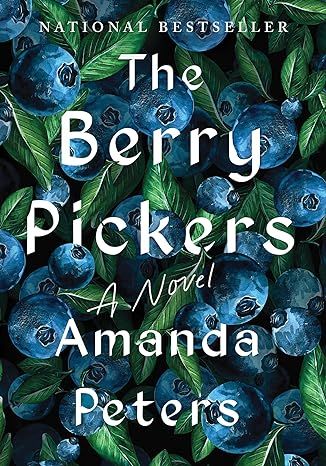
The Berry Pickers: A Novel
4.5
-
14,209
$14.99

Elon Musk
4.7
-
15,272
$16.99
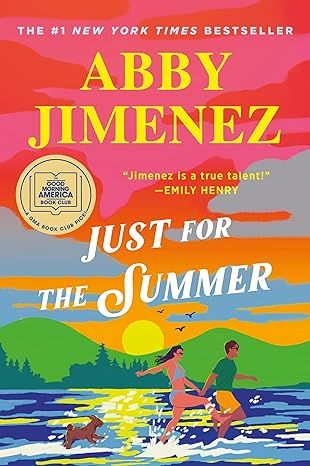
Just for the Summer
4.6
-
19,524
$11.99
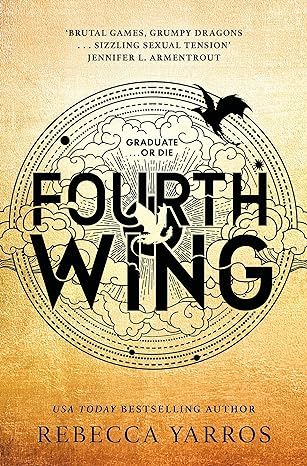
Fourth Wing (International Edition)
4.8
-
206,495
$7.95
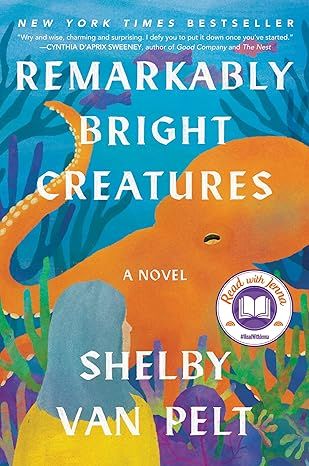
Remarkably Bright Creatures: A Read with Jenna Pick
4.6
-
65,556
$15.80
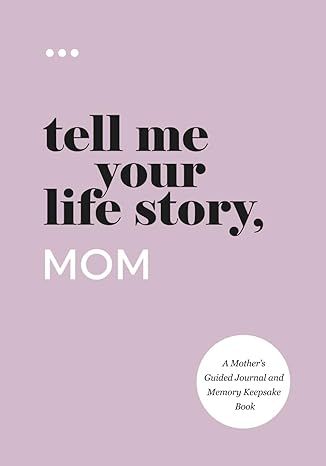
Tell Me Your Life Story, Mom: A Mother’s Guided Journal and Memory Keepsake Book (Tell Me Your Life Story® Series Books)
4.7
-
5,107
$11.24
